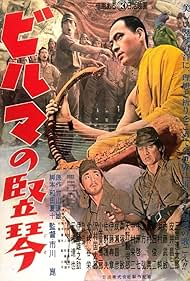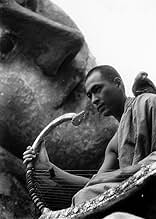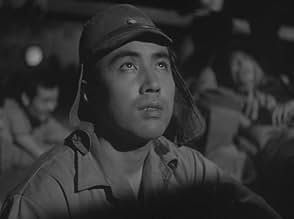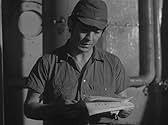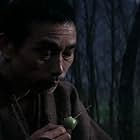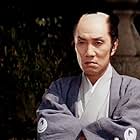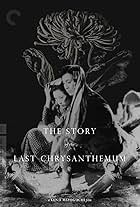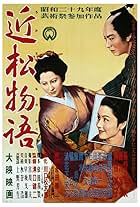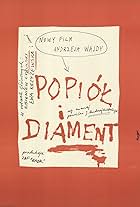A conscience-driven Japanese soldier traumatized by the events of WWII adopts the lifestyle of a Buddhist monk.A conscience-driven Japanese soldier traumatized by the events of WWII adopts the lifestyle of a Buddhist monk.A conscience-driven Japanese soldier traumatized by the events of WWII adopts the lifestyle of a Buddhist monk.
- Nominated for 1 Oscar
- 4 wins & 3 nominations total
- Kobayashi
- (as Takeo Naito)
- Baba
- (as Akira Nishimura)
- Director
- Writers
- All cast & crew
- Production, box office & more at IMDbPro
Storyline
Did you know
- TriviaViewers familiar with Godzilla (1954), may recognize many of the cues present in The Burmese Harp's soundtrack, as composer Akira Ifukube adapted Godzilla's requiem theme into several pieces heard throughout the film.
- GoofsThe modern harp (with its pedal changes and its consequent ability to make changes of harmony, in particular)that is played throughout on the film's soundtrack does not match the much more basic instrument shown in the film.
- Quotes
Captain Inouye: [Excerpt from Mizushima's letter, which Captain Inouye reads to his men as they sail back to Japan] As I climbed mountains and crossed streams, burying the bodies left in the grasses and streams, my heart was wracked with questions. Why must the world suffer such misery? Why must there be such inexplicable pain? As the days passed, I came to understand. I realized that, in the end, the answers were not for human beings to know, that our work is simply to ease the great suffering of the world. To have the courage to face suffering, senselessness and irrationality without fear, to find the strength to create peace by one's own example. I will undergo whatever training is necessary for this to become my unshakable conviction.
- ConnectionsFeatured in Ai no onimotsu (1955)
- SoundtracksHanyuu no Yado
(Japanese Version of 'Home Sweet Home')
In July, 1945, a Japanese platoon in Burma gets captured by the British army. One of the men - named Mizushima - has to go to the mountains to convince another Japanese platoon to surrender. But the latter platoon refuses to do so and all the members get killed in a shootout. As Mizushima walks back to his platoon, he comes across the bodies of more soldiers who perished in the war. Thus he sees his new mission in life: no longer can he be a soldier, but becomes a Buddhist monk, with the aim of healing all affected by the war.
I see Mizushima as representing what Japan as a society had to do following its defeat in WWII. Aside from the fact that the Land of the Rising Sun has had to be a pacifist country (the US forced it to have a constitution prohibiting military intervention), the bombing of Hiroshima made the Japanese people averse to militarism in general. Certainly this movie's anti-war stance makes it all the more relevant in this day and age. I recommend it.
- lee_eisenberg
- Jun 21, 2008
- Permalink
- How long is The Burmese Harp?Powered by Alexa
Details
- Release date
- Country of origin
- Languages
- Also known as
- Die Harfe von Burma
- Filming locations
- Production company
- See more company credits at IMDbPro
Box office
- Gross US & Canada
- $15,812
- Opening weekend US & Canada
- $4,569
- Oct 20, 2024
- Gross worldwide
- $29,560
- Runtime1 hour 56 minutes
- Color
- Sound mix
- Aspect ratio
- 1.33 : 1
Contribute to this page

